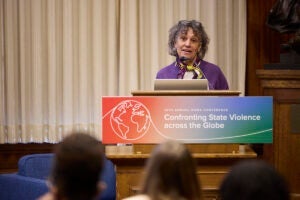Building solidarity to face global injustice

Roma conference at Harvard focuses on confronting state violence
April 24, 2024 —The Roma Program at Harvard’s François-Xavier Bagnoud (FXB) Center for Health and Human Rights, based at Harvard T.H. Chan School of Public Health, marked International Roma Day (April 8) with its 12th annual conference. The hybrid event, held at Harvard’s Barker Center on April 5 and co-sponsored with programs at Central European University, Boston University, and Boston College, focused on confronting state violence across the globe.
Speakers explored how state violence—manifested in direct and systemic forms such as police violence, community neglect, and forced displacement— is experienced by Roma people and other racialized communities. A key theme was the ways in which populations can be othered and dehumanized by political powers, and the catastrophic effects this can have on people’s lives. Participants also touched on pathways for enacting reforms in law, policy, and practice, and how to build solidarity and hope.

“Our ability to achieve health is affected by our ability to obtain our rights,” FXB Director Mary Bassett said in opening remarks. “People who don’t have rights have difficulty surviving and being healthy, and people who are not healthy can’t fully enjoy their lives.” Referencing police shootings in the U.S. and conflicts in Gaza and Sudan, she said that state violence is a global problem.

Roma Program Director Magda Matache said that the conference aimed to center the voices of Roma people, who were included among the panelists, and to “foster solidarity among oppressed and racialized groups, recognizing that there is an interrelated, interconnected nature in our fight against oppression.”
A call for solidarity
Keynote speaker Cornel West, a renowned philosopher and activist, said that there was a spiritual and existential dimension to the conference’s theme and called on audience members to go beyond academic abstractions and really wrestle with their calling to fight global injustice. “How do we become stronger, more courageous, more visionary? How do we sustain our fire in the midst of the various forms of evils enacted and empowered?” he asked.
West stressed the need for solidarity and compared allies in social justice work to members of a band—an observation other speakers throughout the day wove into their remarks.
Two afternoon panels explored facets of state violence in countries around the globe. The themes discussed included tensions around the role of the state as both a source of harm and a provider of resources for population health and wellbeing.
Panelists mentioned a number of ways that systems can impact health, including “health dictatorships,” in which political powers are used to undermine individual autonomy and control information. For example, former president of The Gambia Yahya Jammeh claimed to have the cure for HIV and launched a fraudulent, harmful treatment program and stifled dissent.
Bassett noted that in countries around the world, some lives seem to matter more than others. She said that the day’s discussions had gotten her thinking about the importance of health data, for example, who gets counted by the government, and how being left out can impact health. Many Roma people in Europe, for example, are unable to access services from their governments because they live in informal settlements and don’t have legal status.
In addition, Bassett said that public health is only beginning to grapple with the ways in which systemic assaults on identity can affect mental health for generations.
Natalia Linos, who noted that this was her last week as FXB’s executive director, closed the conference by calling back to West’s remarks and asking audience members to “remember the Roma in their bands.” She noted that while the problems discussed over the course of the day were daunting, there was still hope for change. She said, “Through solidarity, sharing of stories, connections, and networks, you build movements of resistance, imagination, and collaboration.”
Photos: Kent Dayton